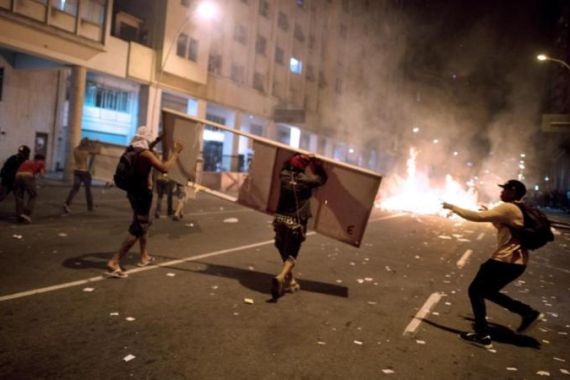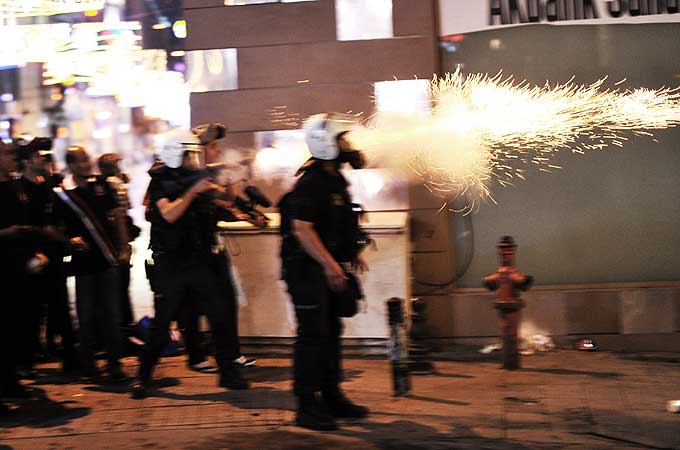Brazil’s first taste of new viral democracy
Protest movements in both Turkey and Brazil have been made unique by the tools used by the younger generation.

It is 8am and a bunch of people line up to get on a bus on Faria Lima Avenue in Sao Paulo. This may be their third transfer in the daily ordeal of travelling to work from the outskirts of Sao Paulo.
When the bus slows down, people start to nudge right or left, hoping not to be left behind. Once they get on, it is so full that finding a little space to stand is only for the truly crafty.
After a one-hour journey through the infamous Sao Paulo traffic and pothole-ridden roads, crammed in with a 100-plus people, it feels more like a ride on a rodeo horse than a means of transportation – all at a cost of 3.20 Brazilian Reals ($1.50) and your dignity.
Many are not even lucky enough to have jobs that require this challenging commute. Some ride the bus to take their sick children to the public hospital. There they will wait for their turn, amidst hundreds of people, to meet a doctor who will probably tell them to have some tests and take a new appointment. The first available appointment is likely to be no sooner than three months.
This is the grim reality endured by most Brazilians. However, there are a lucky few who ride around the city in bullet-proof SUVs and schedule appointments with prestigious doctors who might charge up to $800 for a single visit.
Those who ride busses to work do not live in gated communities with 24-hour security guards and close surveillance cameras – they also don’t have a separate nanny to care for each child.
No normal life
Don’t get the wrong impression – the rich also don’t live a normal life in Brazil. In the midst of a simmering civil war, they live with a constant fear of being attacked and robbed of not only their possessions, but also their lives.
|
|
| Brazil’s middle class protest for basic needs |
The grass does not seem green on any side, not even for the struggling middle class. However, some of the country’s shortcomings are being challenged by the Brazilian people in the recent protests.
The current drama of upheaval started with a 20-cent hike in bus fares. At first, there were small demonstrations in Sao Paulo. Then a larger part of the Brazilian public followed in the footsteps of Turkish protesters to build a movement that spread across the country, exhibiting severe discontent with the system.
The demonstrations addressed the poor quality of public services, inefficient management of government funds and the disproportionate spending on the construction of expensive stadiums for the World Cup.
On Monday – June 17 – hundreds of thousands gathered in the centre of Sao Paulo to call for change. Several slogans captured the spirit of the occasion: “We need hospitals, not stadiums”, “Change Brazil”, “The Giant has Awaken” “It’s not about 20 cents, it’s about our rights!”
The glorification of Brazil’s booming economy is not so prominent on the media agenda these days, as the Brazilian reality looks a little different to those who are living it. In May, the country’s inflation rate reached 6.46 percent, driving consumer prices upwards.
Economic growth has slowed down with GDP figures repeatedly falling below market expectations for the past couple of years. Education remains a big problem in the country and crime rates have been rising, both in major cities and outside.
All these make an acceptable quality of life a luxury, and even the few who are able to pay for it, can hardly get much enjoyment from it given the precariousness of personal security.
Yet, when we hear President Dilma Rousseff’s upbeat speeches we get the misleading impression that Brazil’s growth is strong and steady. Moreover, the country must do all that is necessary to make the World Cup a grandiose event, even if it means spending billions to build spectacular football stadiums.
And for some, like former football legend Ronaldo who said, “You can’t hold a World Cup with hospitals”, such extravagance remains completely justified.
Appearances are important in Brazilian culture and making the World Cup a successful event is a reflection of this. The situation is even more heightened in relation to football, a national obsession, not just a sport.
One can witness similar excesses at carnival time. A samba dancer sometimes spends her annual earnings on her costume for just an event. It seems that the country’s politicians are just as resolved at looking good for the world on their big day as a samba dancer does for her carnival performance.
Viral democracy
Like a wave in a football game, the Brazilians continued the revolutionary zeal started by the Turks. The strong images of the Turkish protests captured Brazil’s attention. It created a surge of empathy with the demonstrators and showed that ordinary people had power to call for change.
Social media was a major tool in disseminating the message of this new form of democratisation that was having an international effect. If the Turks could do it, why couldn’t the Brazilians?
The initial police reaction of using tear gas against the Brazilian protesters served as a powerful catalyst and intensified the protests. The Brazilians had just witnessed their Turkish counterparts endure similar police abuse, and acting in solidarity they became stronger.
A new language of camaraderie was established between the two countries with a flurry of photos and messages posted on Facebook and Twitter. Brazilian and Turkish flags were photoshopped together. Placards carried by Turkish protesters encouraged their Brazilian friends in their resistance. A new transnational generation of revolutionaries was born on the streets and through the internet.
 |
| Spotlight
Turkey Protests
|
At first, the Brazilian demonstrations did not spark any interest of international media like the events in Turkey. After all, protests in Turkey were largely against an Islamic government and particularly against the authoritarian style of Erdogan.
Turkish protests were reminding the world of the country’s still strong secular roots. Needless to say, the possibility of the further spread of political Islam in the region taps into international fears in a stronger way than do Brazil’s domestic problems.
But as the days passed and the Brazilian resistance grew stronger, a new narrative began to form. No matter the differences in their motivations, people were calling for change all over the world, and they were doing so in exciting and innovative ways that seemed to be revitalising democracy. Could we call this phenomenon “a new viral democracy”?
With growing populations and increasing importance as players in the geo political game, Brazil and Turkey have had some parallels in their trajectory. Definitely, the downturn in Europe and the US was a big opportunity for these two emerging powers to assume centre stage.
Both Rousseff and Erdogan show their countries’ socio-economic developments as proof of the great success of their neoliberal capitalist approach. However, there is a growing sense that the leaders have forgotten what the people want from their governments is beyond GNP benchmark.
The protests remind these governments that the people also have a say in their future and they will seek to uphold their individual liberties, quality of life and their right to live in a country that respects them.
What made the protests so unique in both countries was that the messages and tools used by the younger generation reflected their sensibilities as opposed to an archaic form of organised politics.
Inspired by Turkey, the protests in Brazil give many of us in Sao Paulo hope for the country’s future. It shows beyond any doubt that the public, despite widespread poverty, cares about more than material realities, seeking to make democracy and justice come alive.
At least in part, we have to thank the Turkish resistance for giving us in Brazil our first taste of this entirely new viral democracy. Many of us in both countries are now asking, “Where will this lead?” What next?
Zeynep Zileli Rabanea is a freelance writer and translator currently living in Brazil. With a TV and film background, she is working on innovation and creativity projects in Brazil and Turkey.
